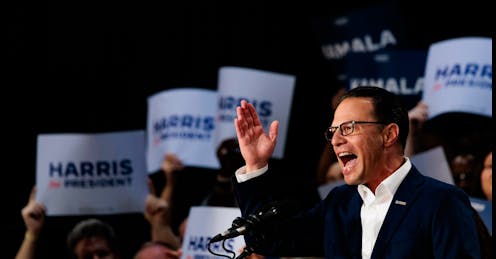Gov. Josh Shapiro has a reputation for getting things done in Pennsylvania – but not necessarily thi
Pennsylvania’s governor has a long history of bipartisan negotiations and seizing moments in the spotlight.

Pennsylvania Gov. Josh Shapiro’s place on the short list of potential Democratic vice presidential nominees has vaulted him to a national profile. That’s not surprising to someone like me who follows Pennsylvania politics closely.
Shapiro is no stranger to both the modern realities of Trumpism in the Republican Party and the nitty-gritty work of legislating across the aisle. An important part of his rise is his “get shit done” mentality, the phrase he readily uses to describe his approach to politics.
Who is Josh Shapiro? And what might his experience with building consensus in the swing state of Pennsylvania mean in the current veepstakes?
Early political ambitions
Shapiro is the consummate politician. He worked as a staffer for several members of Congress before outhustling his competition to earn his own seat in the Pennsylvania House of Representatives.
While in the House, Shapiro built a reputation as a pragmatic reformer and bipartisan operator. He was known for his ambition but also for his engagement with policy.
His most famous consensus-building act was being at the center of bipartisan negotiations in 2007 that resulted in Republican state Rep. Denny O’Brien becoming speaker of the house, even though the Democrats had won a single-seat majority in the chamber.
O’Brien repaid the favor in 2022 when he, along with eight other prominent Republican figures, backed Shapiro for governor over his Republican rival.
As a state representative, Shapiro sponsored an unsuccessful amendment to the state constitution that would have changed Pennsylvania’s partisan judicial elections to a merit appointment system, which echoes the current push from the Biden administration for U.S. Supreme Court reforms.
And he led a bipartisan effort in 2009 to reinstate hate crimes protections for sexual orientation, gender identity and disability after the state’s Commonwealth Court struck down those protections.
Notably, this push failed and has become a perennial debate in Pennsylvania, most recently after the murder of transgender teen Pauly Likens Jr.
County commissioner to attorney general
Shapiro left the Pennsylvania House in 2012 after winning a seat on the Montgomery County Board of Commissioners. The three-member board is essentially the legislature for the county, and Shapiro’s election shifted it from Republican to Democratic control.
His record of “getting shit done” continued as a county commissioner, and he drew praise from the lone Republican commissioner, Bruce Castor, for being “the best county commissioner I ever knew” and “very good at arriving at consensus.”
Leveraging his success and a statewide profile, Shapiro then successfully won two terms, in 2016 and 2020, as Pennsylvania’s attorney general – a position widely considered a steppingstone to the governor’s mansion.
As attorney general, Shapiro was involved in the high-profile investigation of child sexual abuse within the Catholic Church as well as the prosecution of Penn State’s former football coach Jerry Sandusky for the same, and former Penn State President Graham Spanier for covering it up.
He later became the face of the legal fight against the Trump campaign’s claims of election fraud in Pennsylvania in 2020.
An anti-MAGA candidate
Shapiro ran for Pennsylvania governor in 2022. The Democratic Party cleared the field for him, and he continued to assume the anti-MAGA mantle in his race against Republican state Sen. Doug Mastriano.
Mastriano was a key figure in Republican denial of the election results in the 2020 race and proved to be a very weak candidate. In fact, Republican donors largely gave up on Mastriano’s campaign.
In the current veepstakes, some commentators have pointed to Shapiro’s landslide victory in 2022 as a liability. They argue that he has not been tested or vetted enough for a national campaign by running in a tough race.
But during his first two years as governor, Shapiro has held true to his consensus-building persona.
He coordinated the effort to repair a vital bridge on Interstate 95 near Philadelphia in just 12 days, after its collapse from a truck fire rendered the vital highway impassable.
He also appointed Republican Al Schmidt to oversee Pennsylvania’s election system as secretary of state. Shapiro’s argument that “running an election should be a nonpartisan exercise” was another rejection of the election denialism that emerged in the state in 2020.
About-face on school vouchers
Shapiro’s work toward consensus building has at times caused problems for him within his own party.
For example, in 2023, Shapiro appeared to be cruising to an on-time bipartisan state budget. This is something his Democratic predecessor Tom Wolf struggled with.
However, an offer to the Republicans controlling the Pennsylvania Senate – a $100 million school voucher program – angered his allies in the House, narrowly controlled by Democrats.
Shapiro pulled his support, using his line-item veto power to strike the voucher program from the budget after Senate Republicans had passed it.
This move understandably angered Republicans and diminished the chances for other compromises needed on both a spending bill for higher education and the enabling legislation needed to spend the money from the budget.
As a result, state spending, including critical education and human services funding, was delayed for 5½ months until the final budget negotiations were concluded and enabling legislation was passed.
Moderate and bipartisan bona fides
Shapiro has also proven pragmatic on other issues that are central to Pennsylvania politics, but which may not be well accepted by more liberal Democrats in other states.
For example, he backed away from his predecessor’s attempt to have Pennsylvania join the Regional Greenhouse Gas Initiative, a carbon cap-and-trade system in the Northeast. Shapiro has long been skeptical of the initiative and its potential effect on union jobs in one of the top natural gas-producing states in the country.
Shapiro’s support for private school vouchers wasn’t popular with his party in Pennsylvania and also won’t be with national Democrats.
Shapiro has also been at the forefront of several controversies roiling the Democratic Party more broadly. He condemned as “shameful and unacceptable” University of Pennsylvania President Liz Magill’s disastrous testimony before a U.S. House committee investigating campus protests over the Israeli war in Gaza. On the left, the Republican-led committee’s work was largely seen as an attack on higher education.
More broadly, Shapiro, who is Jewish, has been a staunch supporter of Israel at a time when the war in Gaza is roiling the Democratic Party.
If on the ticket, however, Shapiro will not be running in a partisan primary but a general election. That means that all of these stances could help bolster his moderate and bipartisan bona fides nationally.
Harris-Shapiro political chemistry?
In the end, political scientists will say the hype around choosing a swing-state politician – even a popular one like Shapiro – is unlikely to make any difference in the outcome of the election.
But when it comes to Harris selecting her running mate, Shapiro checks two important boxes. Most importantly, he appears to meet the requirement of do no harm to the ticket. As has been seen in recent days with concern among some Republicans over Trump’s choice of U.S. Sen. JD Vance of Ohio as a running mate, a presidential candidate does not want a partner who will potentially drag down the ticket.
Properly vetting and selecting the right candidate who is qualified to be a heartbeat away from the presidency is another important optic in choosing a running mate. Shapiro would seem a safe choice from this perspective, although campaigns often bring out flaws candidates miss.
The pair also came up in politics together. They share a history as state attorneys general, with Shapiro coming into office in 2017 as Harris moved from California attorney general to the U.S. Senate. But they first met in 2006 at a bipartisan seminar for future political leaders, sponsored by the nonpartisan Aspen Institute.
Moreover, Shapiro endorsed Harris in her presidential run in 2019.
Daniel J. Mallinson does not work for, consult, own shares in or receive funding from any company or organization that would benefit from this article, and has disclosed no relevant affiliations beyond their academic appointment.
Read These Next
AI’s growing appetite for power is putting Pennsylvania’s aging electricity grid to the test
As AI data centers are added to Pennsylvania’s existing infrastructure, they bring the promise of…
Why US third parties perform best in the Northeast
Many Americans are unhappy with the two major parties but seldom support alternatives. New England is…
From moral authority to risk management: How university presidents stopped speaking their minds
Nearly 150 universities and colleges have adopted institutional neutrality pledges since 2023.






